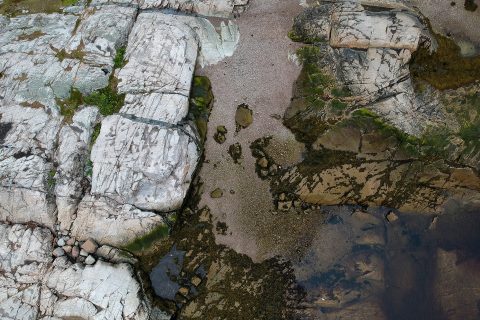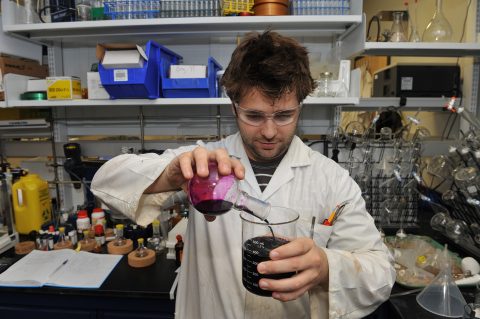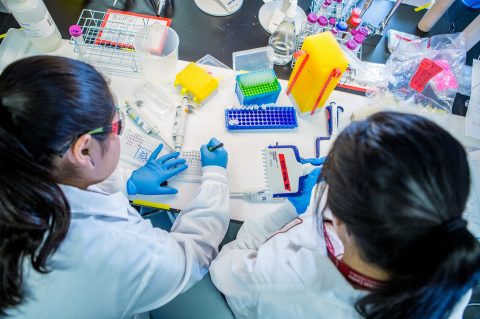Environmental and Sustainability Science (BSc)
Why study Environmental and Sustainability Science?
Climate change, loss of biodiversity, severe weather events, pollution and the unsustainable use of the Earth’s resources are some of the most pressing challenges of our time. If you are fascinated by the science behind how human activity affects our planet, and passionate about creating a more sustainable future, the Environmental and Sustainability Science program is for you.
Following one of the three program streams (Earth Systems and Climate Science, Environmental Biology or Environmental Chemistry), you will learn to understand and assess the impact of human activity on natural cycles, ecosystems, species and landforms, while specializing in one particular disciplinary approach to environmental issues.
Students in all streams will take courses in geography, geology, biology and chemistry to develop the skills and knowledge needed for a career or further studies in the environmental sciences. You will:
- Learn about the physical and chemical processes that shape our planet
- Study the evolution and conservation of biodiversity on earth
- Study the causes and consequences of climate change and environmental pollution
- Learn to design experiments and gather and interpret statistical data
- Acquire technical knowledge of Geographic Information Systems (GIS) and remote sensing
- Learn to develop effective policies for environmental management and the protection of endangered wildlife
Special funding for out-of-province students
Up to $4000 for undergraduate programs.
Program structure
A Bachelor of Science degree takes a minimum of three or four years (90 – 120 credits) of full-time study, depending on your academic background.
Program options
- Honours in Environmental and Sustainability Science (69 credits)*
- Specialization in Environmental and Sustainability Science (63 credits)
*Honours is a highly concentrated program, ideal for students planning to continue to graduate studies. If you are interested in Honours, speak with your program advisor in your first year of study at Concordia. Students applying to the University are able to apply to the specialization.
Capstone course
The degree culminates in the completion of a capstone course, a collaborative small-group experiential learning project in which students from across all program streams evaluate an environmental issue using the expertise of all participants.
The BSc in Environmental and Sustainability Science has three streams:
Earth Systems and Climate Science
Based in the Department of Geography, Planning and Environment, in this stream you will take additional courses in geography and geology and gain the interdisciplinary training needed to address the many pressing environmental issues of the Anthropocene.
Environmental Biology
Based in the Department of Biology, in this stream you will learn about the beauty and diversity of the natural world and explore challenges such as the perturbation of nutrient cycles, the conservation of wild populations and human population growth and resource consumption.
Environmental Chemistry
Based in the Department of Chemistry and Biochemistry, in this stream you will gain further expertise in the physico-chemical processes of the environment, learning to work with quantitative data and understand (bio)chemical reactions on a molecular level. Solid training in analytical chemistry will provide the tools to conduct rigorous environmental assessments.
Courses
See the complete list of courses and full degree requirements in the Undergraduate Calendar:
Co-op program
The Co-op program gives you the chance to complete paid work terms that last 12 to 16 weeks. Co-op is only available to students registered in the Environmental Biology and Environmental Chemistry streams.
United States students: A U.S. Federal Student Aid-eligible version of this program is offered. This version meets all U.S. regulations (such as no co-operative education or e-courses) for eligible programs.
Admission criteria
Minimum cut-off averages and course requirements
- Quebec CEGEP: 25 overall, 24 in math / sciences
- Natural Science DEC or
- DEC intégré en sciences, lettres et arts or
- Calculus 1 & 2; Mechanics, Electricity and Magnetism; Waves, Optics and Modern Physics; General Chemistry; Chemistry of Solutions and General Biology.
- Additional information for CEGEP applicants
- High School: B overall, B in math / sciences
- Canadian curricula course requirements
- Accepted international qualifications
- One math from Pre-Calculus, Calculus, or equivalent
- Two sciences (from Biology, Chemistry or Physics)
- ACT or SAT is not required
- AP exams are not required but may qualify you for advanced standing
- Canadian curricula course requirements
- International Baccalaureate (IB) diploma: 29 overall, 4 HL or 5 SL math, 5 HL science
- one math (Applications and Interpretations HL, Analysis and Approaches HL or Analysis and Approaches SL)
- one science (Physics, Chemistry or Biology, either SL or HL)
- one of the math or science courses must be completed at the HL level
- International Baccalaureate Career-related Programme (CP): 4.8/7 overall, 4 HL or 5 SL math, 5 HL science
- one math (Applications and Interpretations HL, Analysis and Approaches HL or Analysis and Approaches SL)
- one science (Physics, Chemistry or Biology, either SL or HL)
- one of the math or science courses must be completed at the HL level
- Additional Career-related Programme (CP) course requirements
- Baccalauréat français: 13 overall, 13 in math / sciences
- Première: Spécialité mathématiques and Spécialité physique-chimie
- Terminale: Spécialité mathématiques (also accepted, Spécialité Physique-Chimie and Mathématiques Complémentaires)
- Additional information for Baccalauréat français applicants
- Première: Spécialité mathématiques and Spécialité physique-chimie
- British system of education (GCE):
- A-levels: At least two A-level exams CC, C in math, C in science or
- AS-levels: At least 4 AS-level exams with equivalent results or
- BTEC: Level 3 Diploma or Extended Diploma in a related subject area with equivalent results
- Students without math or science A-levels may be admissible based on AS-level or iGCSE/GCSE/O-Level exam results. Students should include all their exam results from iGCSE (or equivalent) onwards to support their application.
- Additional information for British System of Education (GCE) applicants
- University transfers (internal/external): B overall, B in math / sciences
- Courses in the disciplines of Calculus, Biology, Chemistry and Physics
Minimum cut-off averages should be used as indicators. The cut-off data may change depending on the applicant pool. Applicants who meet the stated minimum requirements are not guaranteed admission to these programs.
Application deadlines

FALL ENTRY (September)
Deadline: March 1
International applicants: Apply no later than February 1 to allow time for immigration document processing. However, applying earlier is strongly recommended. Immigration processing times vary by country, and delays could prevent you from starting your studies on time.

WINTER ENTRY (January)
Deadline: November 1
International applicants: Apply no later than August 1 to allow time for immigration document processing. However, applying earlier is strongly recommended. Immigration processing times vary by country, and delays could prevent you from starting your studies on time.
We reserve the right to close admission to a program at any time after the official deadline without prior notice.
After your degree
After graduation, your knowledge and technical skills will prepare you for careers with environmental consulting companies, natural resource agencies and NGOs, or for graduate studies in each of the three core disciplines (Geography, Biology, Chemistry and Biochemistry), in addition to the interdisciplinary field of Environmental and Sustainability Science.
Alumni have established careers in a range of fields including:
- Environmental impact assessment
- Resource conservation
- Environmental analysis and pollutant management
- Environmental consulting
- Geographic Information Systems analysis
- Wildlife and fisheries biology
Student story

Adam Mokhtar
Major Environmental Science
The program is very integrative of different disciplines.

Steffy Velosa
Honours Environmental Science
There are so many student services that make things affordable, and the professors really do make the time for you.
Other programs of interest

As an environmental geography major, you’ll take courses in geography, geology and biology, and enjoy the flexibility to complement your studies in another field of interest.
Department
Department of Geography, Planning and Environment
Faculty

As a chemist, your mastery of chemical reactions could lead to the creation of environmentally-friendly materials like compostable plastics or medications that fight disease.
Department
Department of Chemistry and Biochemistry
Faculty

Get inspired by life. Immerse yourself in the study of life at all levels: from the edge of biochemistry through cell biology and the physiology of multicellular organisms to the interactions between organisms and their environment.
Department
Faculty


